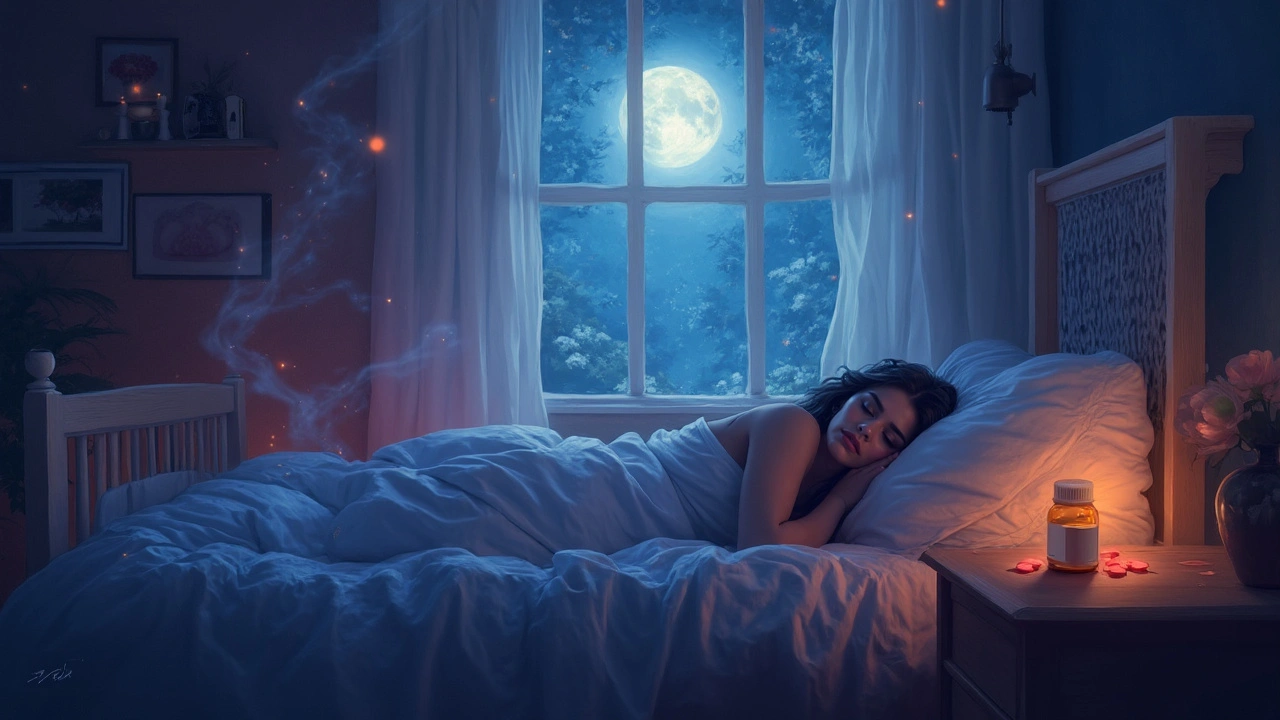If you're taking acamprosate, you're probably familiar with its role in helping maintain alcohol abstinence. But did you know it might also impact how you sleep? This medication, while great for curbing cravings, can throw a curveball at your nightly rest.
Some folks actually report better sleep after starting acamprosate. They wake up feeling refreshed and more balanced. Others, though, find their sleep quality takes a hit—tossing and turning, struggling to reach dreamland.
Understanding acamprosate's influence on sleep can really help. It's not just about pushing through sleepless nights—it's about finding ways to balance the medication's benefits with a good night's rest. Let's explore how acamprosate works, why it affects sleep for some people, and what you can do to catch those elusive zzz's while staying on top of your recovery journey.
- The Connection Between Acamprosate and Sleep
- How Acamprosate Works in the Body
- Effects on Sleep Quality
- Practical Tips for Better Sleep on Acamprosate
- Addressing Sleep Challenges
- Balancing Medication and Rest
The Connection Between Acamprosate and Sleep
First off, it's important to recognize why some folks might see changes in their sleep after starting acamprosate. This medication is primarily used to help people kick alcohol cravings by targeting brain chemistry. It works by balancing neurotransmitters, aiming to reduce the urge for alcohol.
Now, how does that connect to sleep? Well, the brain chemistry that affects alcohol cravings is also linked to how we sleep. When you alter one, the other might follow suit. Some people find themselves sleeping like a log, while others might experience more restless nights.
Interestingly, some studies have noted that acamprosate might lead to changes in sleep architecture, which is just a fancy way of saying how your sleep cycles are arranged. For some, this results in more deep sleep, the kind that truly refreshes. Others might find themselves waking up more during the night, cutting into that precious REM sleep.
But don't let this stress you out. Knowing that this connection exists means you can be more mindful about your sleep routine. Maybe you'll try winding down a bit earlier or adjusting your evening habits to embrace better nighttime habits. We'll get more into practical tips later, but keeping this connection in mind can be a helpful starting point.
How Acamprosate Works in the Body
When you take acamprosate, you're essentially helping your brain stabilize and resist the call of alcohol. This medication isn't just a mind-over-matter trick; it's actually working behind the scenes to adjust chemical imbalances in the brain that are often thrown off by prolonged alcohol use.
So, what's going on exactly? Acamprosate primarily influences neurotransmitter systems, playing a balancing act between the excitatory and inhibitory receptors. It's like forming a truce between your brain's warring factions, helping reduce cravings by restoring some order.
The cool part is, acamprosate doesn't block the feel-good effects of alcohol in your system. Instead, it gets to the root of the problem by calming the overactive NMDA receptors and nudging up the inhibitory GABA receptors. A study from the Journal of Medical Chemistry notes,
"Acamprosate’s role is unique as it eases the hyper-glutamatergic state associated with chronic alcohol dependency."
Yet, it’s key to remember that acamprosate isn’t a magic pill. It works best alongside counseling and support groups. The National Institute on Alcohol Abuse and Alcoholism suggests combining medication with therapy for the best shot at long-term abstinence.
By understanding how acamprosate operates, you're in a better position to realize its potential effects on sleep quality as well. All of these processes can influence how peaceful your nights are, which is something to consider while managing both medication and sleep.
Effects on Sleep Quality
When it comes to using acamprosate, one of the interesting side notes is how it affects your sleep quality. Like with many medications, it can be a bit of a mixed bag when it comes to sleep, affecting people in all sorts of ways.
Firstly, let's talk about the positives. Some people taking acamprosate report that their sleep is more restful. This might be because, as you wean off alcohol, your regular sleep-wake cycle starts to normalize. Basically, lesser exposure to alcohol means your body has a better chance of following its natural rhythm.
On the flip side, others find the transition rough. Acamprosate might cause some sleep disturbances, like trouble falling asleep, staying asleep, or achieving deep sleep. This isn't entirely unexpected, as the medication is working to rebalance your brain's chemistry after years of alcohol use.
Why does this happen? Well, alcohol can mess with your neurotransmitters, affecting sleep by either exciting or inhibiting them more than usual. When you switch to acamprosate, your brain starts adjusting back, which can be quite a change for your sleep patterns.
In an observational study, about 30% of participants noted either an improvement or decline in their sleep quality during the first few weeks of medication. Whether this levels off after your body gets used to the medication is still something researchers are looking into.
For those experiencing insomnia, it's usually temporary. However, if it's impacting you significantly, it's a good idea to discuss it with your healthcare provider. They might recommend adjusting your dose or evaluating other underlying issues that could also impact your sleep.
Ultimately, balancing rest and medication can be tricky, but knowing these potential effects can help you better manage your nights. Staying informed lets you plan for adjustments if your sleep becomes less than stellar.

Practical Tips for Better Sleep on Acamprosate
Struggling with sleep while on acamprosate? You're not alone. Getting restful sleep can make a world of difference in how you feel during recovery. Here are some straightforward tips to help you catch some quality zzz's.
1. **Stick to a Regular Sleep Schedule:** Try to hit the hay and wake up at the same time every day. Our bodies love routine, and sticking to a schedule can help regulate your internal clock.
2. **Create a Relaxing Bedtime Routine:** Doing the same calming activities each night can signal to your brain that it's time to wind down. Think reading a book, taking a warm bath, or listening to soothing music.
3. **Limit Caffeine and Nicotine:** These substances are stimulants and can keep you up. Try to avoid them, especially in the late afternoon and evening.
4. **Watch Your Meals:** Eating big meals close to bedtime can mess with your rest. Opt for lighter evening snacks instead.
5. **Exercise During the Day:** Regular physical activity can promote better sleep. Don't exercise too close to bedtime though, as it could make you too energized to fall asleep.
6. **Keep Your Sleep Environment Comfortable:** Make sure your room is cool, dark, and quiet. Investing in a good mattress and pillows can also be beneficial.
Sometimes, adjusting your environment and habits might not be enough. If sleep issues persist, it might be helpful to have a chat with your doctor. They can offer additional guidance and ensure the medication effects aren't clashing with your needs.
Addressing Sleep Challenges
So, you're on acamprosate and it's messing with your sleep quality? Totally understandable, and you're not alone. Let's dive into some real-world tips to help you find some relief and improve your rest.
First off, it's crucial to pinpoint what's disrupting your sleep. Is it insomnia, waking up multiple times, or maybe struggling to fall asleep in the first place? Knowing this can guide the next steps.
Here are some practical tips to tackle sleep disturbances:
- Routine is key: Try setting a bedtime and sticking to it. Your body loves consistency, and this helps train your internal clock.
- Limit screen time: Blue light from phones and laptops can trick your brain into thinking it's still day. Reduce screen exposure at least an hour before bed.
- Watch the caffeine: Lattes are life, but try cutting back on caffeine in the late afternoon to help you wind down at night.
- Make a chill space: Your bedroom should feel like a rest haven – cozy, dark, and cool. Maybe even break out that essential oil diffuser for a calming scent.
Sometimes, a chat with your doctor is wise if these changes don't help. They can troubleshoot with you and even adjust the dosage of acamprosate if needed.
Around 20% of people on this medication see some sleep problems resolving on their own after a few months, as their body adjusts. But never hesitate to seek support if things aren't improving. Remember, your sleep is as important to your recovery as the medication itself.
Balancing Medication and Rest
Finding harmony between taking acamprosate and enjoying quality sleep involves a few practical steps. Now that you've got the basics of how this medication can affect your sleep, it’s all about tweaking habits to create a more restful environment.
First up, consider your timing. Taking acamprosate with meals might help stabilize its presence in your system, reducing any potential disturbances at night. While it doesn’t come with strict time-of-day recommendations, aligning doses with meals could mitigate evening restlessness.
Establishing a consistent sleep schedule can make a world of difference. Our bodies thrive on routine, much like training a new pet. Go to bed and wake up at the same time daily, even on weekends. Your internal clock will thank you.
Creating a calming pre-sleep routine can also help. This isn’t just sage wisdom—it’s about signaling to your body that it’s time to wind down. Think of quiet activities like reading or using a relaxation app.
- Monitor caffeine and sugar intake: Minimize these, especially in the afternoon and evening, as they can counteract the calming effects of your medicine.
- Evaluate your sleep environment: Comfort is key. A supportive mattress, cool room, and minimal noise can aid relaxation.
- Talk with your doctor: If consistent sleep disruptions occur, it's crucial to discuss this with a healthcare provider. They might tweak the dosage or explore other options.
Balancing the benefits of acamprosate with restful sleep is a journey. With these tweaks and a bit of patience, you’re well on your way to finding a balance that supports both your recovery and a good night’s rest.



It's wild how something meant to heal your brain can also mess with your sleep like this. I used to think sleep was just about tiredness, but now I see it's this delicate dance between neurotransmitters, trauma, and timing. Acamprosate doesn't just stop cravings-it’s rewriting your internal rhythm. And that’s not a bug, it’s a feature of recovery. You’re not broken if you’re tossing and turning. You’re just in transition.
I’ve been on it 3 months. Sleep got worse at first, then slowly improved. Stick with it.
Let’s be real-this isn’t medicine, it’s a chemical leash. Big Pharma doesn’t want you sleeping well, they want you dependent on their next ‘solution.’ Acamprosate messes with GABA and glutamate? That’s neurochemical warfare. They don’t care if you’re tired-they care if you’re still buying pills. Wake up.
bro i was up at 3am scrolling through r/stopdrinking and realized my brain’s been rewired like a glitchy android. 😅 acamprosate ain’t magic, it’s more like your brain’s doing yoga after 20 years of breakdancing on acid. i started drinking chamomile tea with a dash of honey before bed and now i’m actually dreaming again. 🌿✨ also, i miss my dog. he slept on my chest every night before i quit. now he just stares. it’s weird.
I felt the same way. The first two weeks were brutal. I’d wake up every two hours feeling like my body was trying to escape itself. But I kept the routine-no screens, cool room, 10 minutes of breathing before bed. Now I’m sleeping 7 hours straight. It’s not perfect, but it’s mine again.
Oh, darling, you’re telling me this is a *side effect*? I thought it was just the universe finally punishing me for that one time I drank tequila while watching *The Bachelor*. Sleep? Please. I haven’t had a full night’s rest since I last saw a sunset without a bottle in hand. But hey-at least I’m not drinking. And my therapist says that’s worth a gold star. 🌟
It’s important to remember that acamprosate’s mechanism isn’t just about GABA and glutamate-it’s about restoring homeostasis after prolonged neurochemical disruption. The brain doesn’t recalibrate overnight; it’s a slow, nonlinear process where synaptic pruning and receptor sensitivity adjustments occur over weeks to months. Many of the sleep disturbances reported aren’t side effects per se, but rather withdrawal manifestations from chronic alcohol-induced dysregulation. The fact that sleep quality improves for many after 6–12 weeks suggests neuroadaptation, not pharmacological interference. So while the initial insomnia can be hellish, it’s often a sign that your brain is actively healing, not breaking down. Don’t rush the process. Consistency in sleep hygiene isn’t optional-it’s part of the pharmacological support system.
Carl here. I’ve been on acamprosate for a year now. Sleep got better after 8 weeks. I stopped drinking at 30. Now I’m 35. I don’t dream about bottles anymore. That’s the win.
Based on the 2018 meta-analysis in *Addiction Biology*, acamprosate increases slow-wave sleep duration by approximately 18% in abstinent individuals after 12 weeks of treatment, while reducing sleep latency by 22%. The variability in initial sleep disruption correlates strongly with baseline GABA receptor density and prior alcohol consumption patterns. Patients with >10 years of heavy use show higher incidence of transient insomnia, likely due to prolonged NMDA receptor hypersensitivity. Sleep hygiene interventions are empirically supported as adjuncts-not alternatives-to pharmacotherapy. If sleep remains disrupted beyond 16 weeks, consider evaluating for comorbid anxiety or circadian rhythm disorders. Don’t assume it’s the medication-it might be the recovery.